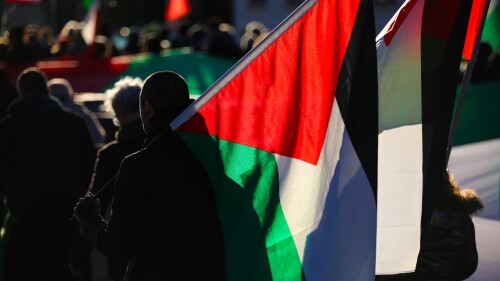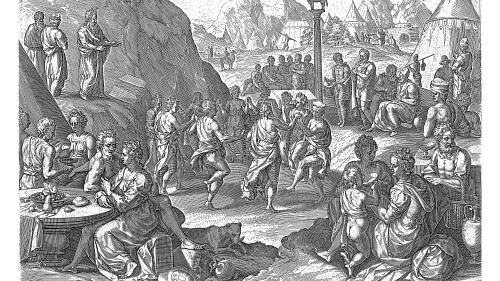For years, and long before Oct. 7, Gaza has languished as one of the most troubled enclaves on Earth: A strip of land mired in poverty, controlled by Hamas and functioning both as a human shield and propaganda tool for regional powers. In the aftermath of the massacre of 1,200 people in southern Israel on Oct. 7, 2023, Gaza was reduced to a little more than rubble, with no country willing to help end the crisis.
Now, U.S. President Donald Trump has announced a bold—some would say quixotic—plan to “take over” Gaza, turn it into a glittering American “Riviera of the Middle East,” and provide alternate homes for Gazans in Egypt and Jordan. At face value, the move has the potential to shake the region’s stagnation. It might even push Arab states to either step up with a realistic solution or cede control to a U.S.-led effort at reconstruction and modernization.
Yet, one glaring obstacle stands in the way: Qatar.
If Trump expects Arab leaders to help solve the Gaza crisis, he must also pressure Qatar to rein in its propaganda networks and ongoing alliance with the Muslim Brotherhood. These networks, notably Al Jazeera, have long used the Palestinian quagmire as a cudgel to hammer other Arab regimes, portraying them as complicit in Israel’s siege or indifferent to Palestinian suffering. In so doing, they undermine rival governments that are already wary of a backlash from their own citizens and the broader Arab street.
If Trump expects Arab leaders to help solve the Gaza crisis, he must also pressure Qatar to rein in its propaganda networks and ongoing alliance with the Muslim Brotherhood.
Qatar’s posture in the Middle East has always involved a delicate balancing act. On the one hand, Doha flaunts its relations with Washington, hosts a major U.S. military base and positions itself as a modernizing, business-friendly emirate. On the other, it funds and gives shelter to Islamist groups, from the Muslim Brotherhood and Hamas to more extreme jihadists. That same duality extends to its media empire. Al Jazeera’s Arabic channel regularly lambasts the region’s monarchies and strongmen for failing to support the Palestinians, all while the Qatari monarchy cultivates cordial ties with Western powers like the United States, having thousands of American technocrats and professors on its generous payroll.
This duplicity is not lost on the region’s leaders. They know that if they so much as nod in the direction of a U.S. plan for Gaza, Al Jazeera’s cameras will magnify every perceived betrayal or shortfall, labeling them traitors who capitulate to American imperial designs. In such a volatile environment, any Arab ruler who endorses a Trump-led initiative to restructure Gaza’s political future may be handing Qatar’s media the perfect rhetorical weapon. Even the suggestion of letting a “Riviera in the Middle East” be built is being spun as “selling out the Palestinian cause” or “destroying Palestinian identity.”
Domestic opponents in Egypt, Jordan or Saudi Arabia, for instance, can seize on that narrative—weaponizing Al Jazeera’s coverage to rouse popular outrage. No leader wants to face the wave of condemnation that might stem from a 24/7 news cycle painting them as complicit in the final displacement of Palestinians. The specter of the Arab Spring and waves of protests that toppled governments remain fresh in their memory. A single storyline, “X regime is handing over Palestinian land to the American bulldozer,” could stoke unrest among populations already fatigued by economic hardships and historical grievances.
If Trump is serious about forging a solution in Gaza, then he must address the contradictions in Washington’s relationship with Qatar. Historically, the United States has treated Doha with kid gloves. Qatar invests heavily in American real estate, business ventures, universities, and, not least, lavish lobbying campaigns in Washington. Over the years, an array of Beltway insiders, think tanks and political influencers have found themselves on Qatari payrolls, enjoying lucrative consulting contracts that often hamper scrutiny of Doha’s double-dealings.
For the president to propose a visionary reimagining of Gaza while still embracing Qatar’s emir, Tamim bin Hamad Al Thani, is to perpetuate American hypocrisy.
That same scenario looms large over the Trump administration. On one side, Trump champions a new Middle Eastern order—cracking down on extremism and ending the endless tragedies. On the other, Qatar remains an ostensible ally, never facing real pressure to restrain Al Jazeera’s incendiary narratives or break from the Muslim Brotherhood. For the president to propose a visionary reimagining of Gaza while still embracing Qatar’s emir, Tamim bin Hamad Al Thani, is to perpetuate American hypocrisy. If Washington fails to push Doha on the media front, any arrangement for Gaza could collapse under a barrage of Qatari-sponsored propaganda that incites the region’s populations and torpedoes any meaningful buy-in from Arab states.
Most Arab capitals—from Riyadh to Cairo—are well aware of Qatar’s media prowess and ideological gambits. Their caution on endorsing dramatic shifts in Gaza’s future stems not only from the fear of domestic backlash but from a broader anxiety that any perceived alignment with U.S. policy offers easy fodder to Al Jazeera’s editorial team. Meanwhile, Qatar continues to project an image of progressive diplomacy and philanthropic generosity to the Palestinians while effectively controlling the narrative that defines how other Arab states are judged on the issue.
Ultimately, the dissonance arises from the United States wanting to champion stability and oppose extremist narratives yet refusing to confront an ally that skillfully plays both sides. At stake is not simply the success or failure of a futuristic “Gaza Rivieraplex,” but whether Middle Eastern alliances—and indeed, American diplomacy—can transcend petty entanglements with a tiny emirate wielding outsized influence. Should Trump proceed without addressing Doha’s propaganda might, then he’ll be effectively inviting a fresh round of condemnation to any Arab state bold enough to join his plan.
His grand vision to transform Gaza may sound like a pipe dream or a cynically choreographed move to corner Arab leaders. In either case, a crucial piece is missing: a determination to hold Qatar accountable. If that piece is absent, any talk of radical change in Gaza will only feed the region’s vicious cycle, wherein politicians float grand ideas, Qatari media tears them down, and the Palestinians remain in tragic limbo.








